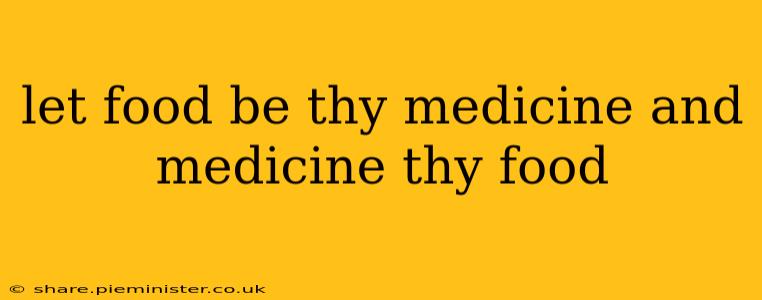The ancient adage, "Let food be thy medicine and medicine be thy food," highlights the profound connection between diet and health. This philosophy, attributed to Hippocrates, emphasizes the power of nutrition to prevent and treat illness, promoting a holistic approach to wellness that goes beyond simply avoiding sickness. This isn't about fad diets or restrictive eating; it's about understanding the vital role food plays in our overall well-being. This article delves into the principles of this philosophy, exploring how mindful eating can significantly impact our health and longevity.
What Does "Let Food Be Thy Medicine" Really Mean?
This isn't a suggestion to forgo medical treatment. Instead, it underscores the preventative and therapeutic potential of food. By consuming a diet rich in nutrient-dense foods, we can strengthen our immune system, reducing susceptibility to illness. Conversely, a diet lacking in essential nutrients or overloaded with processed foods, sugars, and unhealthy fats can contribute to chronic diseases like heart disease, type 2 diabetes, and certain cancers. The focus is on using food as a primary tool for maintaining optimal health, minimizing the need for medical intervention in many cases.
How Can Food Act as Medicine?
The body thrives on a balanced intake of macronutrients (carbohydrates, proteins, and fats) and micronutrients (vitamins and minerals). Each nutrient plays a specific role in various bodily functions. For example:
- Antioxidants: Found in fruits and vegetables, these combat free radicals, protecting cells from damage and reducing the risk of chronic diseases.
- Fiber: Crucial for digestive health, fiber promotes regularity, lowers cholesterol, and helps regulate blood sugar levels.
- Omega-3 Fatty Acids: Present in fatty fish and flaxseeds, these support heart health, brain function, and reduce inflammation.
- Phytonutrients: Naturally occurring compounds in plants, these possess potent anti-inflammatory and disease-fighting properties.
What are Some Examples of Foods That Act as Medicine?
Many foods possess specific medicinal properties. Here are a few examples:
- Ginger: Known for its anti-inflammatory and anti-nausea properties.
- Turmeric: Contains curcumin, a powerful antioxidant with anti-inflammatory effects.
- Garlic: Possesses antimicrobial and immune-boosting properties.
- Blueberries: Rich in antioxidants, supporting brain health and reducing the risk of certain cancers.
- Leafy Greens: Packed with vitamins, minerals, and fiber, promoting overall well-being.
What are the Benefits of a "Food as Medicine" Approach?
Adopting a "food as medicine" approach offers numerous benefits:
- Reduced risk of chronic diseases: A balanced diet significantly lowers the risk of heart disease, type 2 diabetes, certain cancers, and other chronic illnesses.
- Improved energy levels: Nutrient-rich foods provide sustained energy, unlike the sugar crashes associated with processed foods.
- Enhanced immune function: A balanced diet strengthens the immune system, making the body more resilient to infections.
- Improved mental clarity: Nutrients play a vital role in brain health and cognitive function.
- Better weight management: A focus on whole, unprocessed foods naturally leads to healthier weight management.
How Can I Incorporate This Approach into My Life?
Transitioning to a "food as medicine" approach involves gradual changes:
- Prioritize whole, unprocessed foods: Focus on fruits, vegetables, whole grains, lean proteins, and healthy fats.
- Limit processed foods, sugar, and unhealthy fats: These contribute to inflammation and various health problems.
- Hydrate adequately: Water is essential for all bodily functions.
- Cook more meals at home: This gives you greater control over ingredients and portion sizes.
- Consult a registered dietitian or nutritionist: A professional can help create a personalized plan tailored to your individual needs.
Is it enough to just rely on food for healing?
While a healthy diet is crucial for preventing and managing many health conditions, it's important to remember that it's not a replacement for professional medical care. Food can be a powerful tool in your health journey, but for serious illnesses or health concerns, consulting a doctor or other healthcare professional is essential. A holistic approach often combines dietary changes with other therapies for optimal results.
By understanding the powerful connection between food and health, we can harness the potential of nutrition to improve our well-being and lead healthier, more fulfilling lives. Remember, "Let food be thy medicine and medicine be thy food" is a guiding principle for a holistic approach to wellness, emphasizing the critical role of nutrition in preventing and managing disease.
